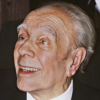Jorge Luis Borges

Jorge Luis Borges
Jorge Francisco Isidoro Luis Borges KBE; 24 August 1899 – 14 June 1986), was an Argentine short-story writer, essayist, poet and translator, and a key figure in Spanish-language literature. His best-known books, Ficcionesand El Aleph, published in the 1940s, are compilations of short stories interconnected by common themes, including dreams, labyrinths, libraries, mirrors, fictional writers, philosophy, and religion...
NationalityArgentinian
ProfessionPoet
Date of Birth24 August 1899
stars sunset past
Not a single star will be left in the night. The night will not be left. I will die and, with me, the weight of the intolerable universe. I shall erase the pyramids, the medallions, the continents and faces. I shall erase the accumulated past. I shall make dust of history, dust of dust. Now I am looking on the final sunset. I am hearing the last bird. I bequeath nothingness to no one.
book might kind
The European and the North American consider that a book that has been awarded any kind of prize must be good; the Argentine allows for the possibility that the book might not be bad, despite the prize.
art exercise intellectual
There is no intellectual exercise which is not ultimately useless.
mirrors two labyrinth
It only takes two facing mirrors to build a labyrinth.
time way different
Time can't be measured in days the way money is measured in pesos and centavos, because all pesos are equal, while every day, perhaps every hour, is different.
horse voice bars
What will die with me the day I die? What pathetic or frail image will be lost to the world? The voice of Macedonio Fernandez, the image of a bay horse in a vacant lot on the corner of Sarrano and Charcas, a bar of sulfur in the drawer of a mahogany desk?
art memories book
The gods weave misfortunes for men, so that the generations to come will have something to sing about.” Mallarmé repeats, less beautifully, what Homer said; “tout aboutit en un livre,” everything ends up in a book. The Greeks speak of generations that will sing; Mallarmé speaks of an object, of a thing among things, a book. But the idea is the same; the idea that we are made for art, we are made for memory, we are made for poetry, or perhaps we are made for oblivion. But something remains, and that something is history or poetry, which are not essentially different.
what-matters matter no-matter-what
All theories are legitimate, no matter. What matters is what you do with them.
men drawing labyrinth
A man sets himself the task of portraying the world. Shortly before he dies he discovers that this patient labyrinth of lines is a drawing of his own face.
evil spheres ethics
One concept corrupts and confuses the others. I am not speaking of the Evil whose limited sphere is ethics; I am speaking of the infinite.
dream morning memories
Days and nights passed over this despair of flesh, but one morning he awoke, looked (with calm now) at the blurred things that lay about him, and felt, inexplicably, the way one might feel upon recognizing a melody or a voice, that all this had happened to him before and that he had faced it with fear but also with joy and hopefulness and curiosity. Then he descended into his memory, which seemed to him endless, and managed to draw up from that vertigo the lost remembrance that gleamed like a coin in the rain - perhaps because he had never really looked at it except (perhaps) in a dream.
fall hands wind
Once I am dead, there will be no lack of pious hands to throw me over the railing; my grave will be the fathomless air; my body will sink endlessly and decay and dissolve in the wind generated by the fall, which is infinite.
art opportunity men
Chang Tzu tells us of a persevering man who after three laborious years mastered the art of dragon-slaying. For the rest of his days, he had not a single opportunity to test his skills.
knowing way causes
I have no way of knowing whether the events that I am about to narrate are effects or causes.